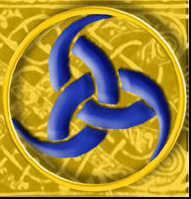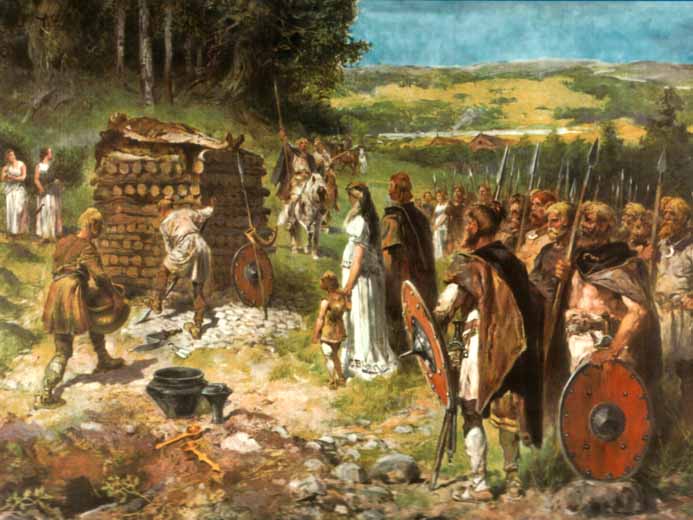
Terms of
Use
Submissions
~ Historical & Classical Poetry ~
Composed toward the end of the
first millennium, Beowulf is the classic Northern epic
of a hero's triumphs as a young warrior, killing the monster Grendel and its
mother,
and his fated death as a defender of his people.
Translation from Anglo-Saxon in alliterative verse
by Francis Barton Gummere (1855 - 1919).
Find the whole poem here.
Beowulfs funeral (chapter 41/last chapter)
XLI
THEN fashioned for him the folk of Geats
firm on the earth a funeral-pile,
and hung it with helmets and harness of war
and breastplates bright, as the boon he asked;
and they laid amid it the mighty chieftain,
heroes mourning their master dear.
Then on the hill that hugest of balefires
the warriors wakened. Wood-smoke rose
black over blaze, and blent was the roar
of flame with weeping (the wind was still),
till the fire had broken the frame of bones,
hot at the heart. In heavy mood
their misery moaned they, their master's death.
Wailing her woe, the widow old,
her hair upbound, for Beowulf's death
sung in her sorrow, and said full oft
she dreaded the doleful days to come,
deaths enow, and doom of battle,
and shame. -- The smoke by the sky was devoured.
The folk of the Weders fashioned there
on the headland a barrow broad and high,
by ocean-farers far descried:
in ten days' time their toil had raised it,
the battle-brave's beacon. Round brands of the pyre
a wall they built, the worthiest ever
that wit could prompt in their wisest men.
They placed in the barrow that precious booty,
the rounds and the rings they had reft erewhile,
hardy heroes, from hoard in cave, --
trusting the ground with treasure of earls,
gold in the earth, where ever it lies
useless to men as of yore it was.
Then about that barrow the battle-keen rode,
atheling-born, a band of twelve,
lament to make, to mourn their king,
chant their dirge, and their chieftain honor.
They praised his earlship, his acts of prowess
worthily witnessed: and well it is
that men their master-friend mightily laud,
heartily love, when hence he goes
from life in the body forlorn away.
Thus made their mourning the men of Geatland,
for their hero's passing his hearth-companions:
quoth that of all the kings of earth,
of men he was mildest and most beloved,
to his kin the kindest, keenest for praise.